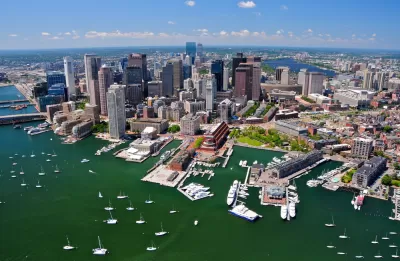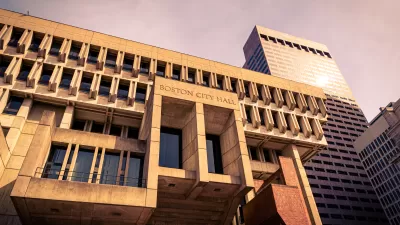As part of the city’s broader climate goals, Mayor Michelle Wu wants to require all new buildings to eliminate the use of fossil fuels.

After Massachusetts Governor Charlie Baker signed a climate bill last week, Boston Mayor Michelle Wu plans to introduce legislation that would eventually eliminate the use of fossil fuels in new construction in the city, where buildings make up roughly 70 percent of the city’s emissions.
As Maria Rachal reports in Smart Cities Dive, “The state law establishes a pilot program that will allow 10 municipalities to create local policies restricting the use of fossil fuels in new construction projects.” At present, Boston would be the 11th city to file a petition, but could be included in the program if other communities fail to meet the program’s requirements. “Those communities include Brookline, a town in the Boston suburbs that voted in 2019 to become the first East Coast town to ban fossil fuel hookups in new buildings but ultimately was not allowed by the state to do so.”
According to the source article, “Boston, a member of the national Building Performance Standards Coalition, last fall adopted a building performance standard that requires all buildings 20,000 square feet or larger to meet certain emissions targets by 2025, and have zero carbon emissions by 2050.” The city will engage in a public input process before determining the final parameters and timelines for making buildings fossil fuel-free.
FULL STORY: Boston aims to eliminate fossil fuels in new buildings

Alabama: Trump Terminates Settlements for Black Communities Harmed By Raw Sewage
Trump deemed the landmark civil rights agreement “illegal DEI and environmental justice policy.”

Planetizen Federal Action Tracker
A weekly monitor of how Trump’s orders and actions are impacting planners and planning in America.

The 120 Year Old Tiny Home Villages That Sheltered San Francisco’s Earthquake Refugees
More than a century ago, San Francisco mobilized to house thousands of residents displaced by the 1906 earthquake. Could their strategy offer a model for the present?

In Both Crashes and Crime, Public Transportation is Far Safer than Driving
Contrary to popular assumptions, public transportation has far lower crash and crime rates than automobile travel. For safer communities, improve and encourage transit travel.

Report: Zoning Reforms Should Complement Nashville’s Ambitious Transit Plan
Without reform, restrictive zoning codes will limit the impact of the city’s planned transit expansion and could exclude some of the residents who depend on transit the most.

Judge Orders Release of Frozen IRA, IIJA Funding
The decision is a victory for environmental groups who charged that freezing funds for critical infrastructure and disaster response programs caused “real and irreparable harm” to communities.
Urban Design for Planners 1: Software Tools
This six-course series explores essential urban design concepts using open source software and equips planners with the tools they need to participate fully in the urban design process.
Planning for Universal Design
Learn the tools for implementing Universal Design in planning regulations.
Clanton & Associates, Inc.
Jessamine County Fiscal Court
Institute for Housing and Urban Development Studies (IHS)
City of Grandview
Harvard GSD Executive Education
Toledo-Lucas County Plan Commissions
Salt Lake City
NYU Wagner Graduate School of Public Service





























